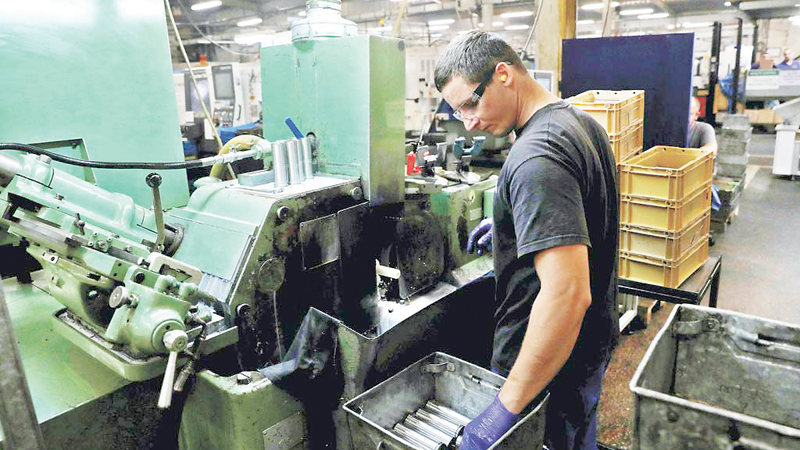

David Milliken -
At Muller Precision Engineering’s plant in Redditch, south of Birmingham, James Gibbs is in charge of three clattering pieces of machinery older than he is. His two co-workers — one Polish, the other Hungarian — place semi-finished metal parts on plastic spindles every 20 seconds and hold them between grinders for another 15 seconds, then check their dimensions before dropping them into a tray.
“It’s a very repetitive job,” said Gibbs, 27. “You’ve got to keep your concentration for however many hours you’re on there, so that you don’t misload it.” By the middle of next year, the work of two of the staff will be done by sensors and robotic arms.
British manufacturers have long lagged behind their developed country peers on automation, thanks in part to a seemingly inexhaustible pool of workers from Europe.
The flow of low-cost labour has become less reliable since Britain voted to leave the European Union in June 2016, however. Net migration from eastern Europe hit an eight-year low in the 12 months to March, official data shows, and industry groups fear the situation will only get worse.
Unlocking automation investment could have big implications for the economy. If companies tilt away from labour, it could boost productivity and take the lid off wage increases that have languished at around 2 per cent in recent years.
Muller is already heavily automated, with covered conveyors feeding parts to computer-controlled lathes. The £150,000 ($196,000) investment in Redditch will automate processes to make components for Volvo truck brakes.
Manual work at the site can be boring and dangerous, which can make it hard to find staff, said Adam Cunningham, managing director at the plant, which employs around 130 people.
“That, along with a Brexit that reduces the amount of labour coming into the country, made us say we need to look at automation in that particular area,” he said. “Basically, we’re going to be replacing humans with robots.”
The International Federation of Robotics (IFR) says British factories are less likely to use industrial robots than any other leading economy and even some countries in eastern Europe.
Bank of England (BoE) officials and industry experts say they may finally be catching up.
“Firms are increasingly investing in automation, substituting capital for labour, as workers become more scarce and costly,” central bank officials Will Holman and Tim Pike wrote in July on a BoE economic research blog.
While the blog did not specifically mention Brexit, it referred to problems with recruitment in sectors that rely heavily on migrants.
Last year Britain’s statistics agency cut its long-run forecast for immigration compared with before the referendum, and the central bank said a Brexit-related slowdown in labour supply was reducing the rate at which the economy could grow.
British businesses are investing in robots for factories, meat processing plants and warehouses, as well as self-service checkouts in supermarkets and automated check-in for hotels, research by the BoE’s regional staff, or “agents”, showed.
The bank’s 30 agents visit 9,000 businesses a year to spot trends. Businesses were focusing on investment in automating labour-intensive processes rather than boosting production more than ever before, the research indicated.
Some catch-up on automation had been expected after several years of falling unemployment. But the fact it is happening now is notable, given that economists believe Brexit is likely to dampen business investment overall.
The trend is also showing up in official indicators.
Customs data shows imports of multi-purpose industrial robots, which can be reprogrammed to perform new tasks and usually have arms capable of moving in three dimensions, rose to a record £83.2 million in the year to the end of July, up by 72 per cent on the previous 12-month period.
These are the types of robots the IFR is talking about when it says Britain is behind on automation. — Reuters
Oman Observer is now on the WhatsApp channel. Click here



